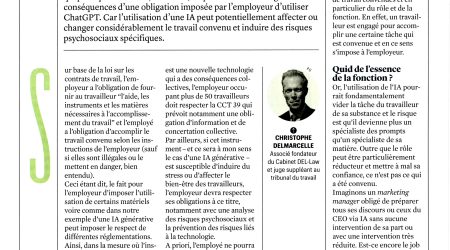During a social inspection, can employer representatives remain silent or refuse to provide documents?
Posted the 22 September 2021In these times of COVID, the question of the right to remain silent during a social inspection arises even more acutely. Especially given the extensive powers of social inspectors and the severe penalties that may apply, particularly if you are accused of “obstructing the inspection,” which is subject to a level 4 sanction—the highest under the Social Penal Code—entailing heavy fines and even possible imprisonment. What can be done?
The right to remain silent is expressly recognized by the International Covenant on Civil and Political Rights and implicitly by Article 6 of the European Convention on Human Rights (ECHR).
This right is closely linked to the presumption of innocence and aims to prevent the forced or coerced acquisition of information.
It can be defined as the right of a person accused of a criminal offense not to be compelled to testify against themselves or to confess guilt.
This includes the right to refuse to answer questions posed by social inspectors or, more broadly, to refuse to participate in investigations conducted by these authorities.
However, the boundary of the right to silence and the right against self-incrimination is not absolute, and the European Court of Human Rights has defined its limits in several rulings.
First, it is possible to waive this right, and anyone participating in a social inspection would do well to avoid expressly or implicitly waiving this right.
Second, the scope of application requires that the person is under the coercive power of the authorities and that their answers could potentially be incriminating.
As a result, refusing to answer all questions indiscriminately will not be accepted. One may only refuse to answer questions that could potentially lead to self-incrimination.
Certainly, being punished for “obstructing the investigation” is generally not prohibited. However, as recalled by the Tongeren Labour Court, a defendant cannot be convicted of obstructing surveillance solely for remaining silent during an inspection.
Moreover, the right to remain silent applies in the case of criminal proceedings or investigations, even though its application in the so-called "administrative" or "pre-contentious" phase is possible.
Finally, the exercise of this right cannot be abusive, and it is generally considered that the right to silence does not allow for the refusal to provide documents that are legally required, such as individual accounts, workplace regulations, or payroll slips.
Last but not least, it is obvious that this right does not allow lying. During an inspection, it is always better to remain silent than to make false statements. This means thinking carefully before speaking and considering the consequences of any declarations.
Related articles

Is an employer allowed to mandate the use of artificial intelligence tools by employees ? (Trends, 17-07-2025)

Caution if a former colleague opposed to your employer asks you to testify in their favor
